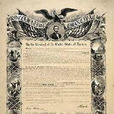歷史背景
南北戰爭爆發後,相當多的黑奴自願為自身自由而協助聯邦作戰,但對如何處理占領地黑奴觀點上仍有所衝突。林肯一開始收回某些將軍自行發布的解放黑奴命令,而此政策嚴厲執行則造成逃亡黑奴必須回到他們南方主子那兒,但1862年3月13日邦聯政府禁止所有聯邦軍指揮官遣返逃亡黑奴,如此影響了《1850年逃亡奴隸法》的廢除。1862年4月11日,國會宣布聯邦政府將保障釋放黑奴的奴隸主,所有在華盛頓的黑奴於1862年4月16日獲得解放。1862年7月19日國會廢止聯邦領土上的奴隸制度,如此使美國最高法院於1857年《得福德·史考特訴桑福德案》(Dred Scott v. Sandford)作出的決議失去效力:此決議曾導致國會一度無權監督國土上的黑奴制度。
林肯曾宣稱他自己沒有憲法賦予的權力解放黑奴,此外,解放黑奴是種具有風險的政治行為,因為仍有部分畜奴州效忠於聯邦,且戰爭初始的目的集中在保護聯邦的完整而非解放黑奴。基於如此,這份宣言當時只是份而由林肯自己理解為以三軍統帥的身份所發表的軍事命令,而非由國會公布具同等地位的法案或憲法增修條文。另外有些論點認為解放奴隸宣言本身乃違憲,且是種領袖擴權指揮軍隊行動,而非創造新法(可參考《楊斯頓鋼鐵公司總統許可權案》Youngstown Sheet and Tube Co. v. Sawyer, 343 U.S. 579 (1952) 其主張總統無權以三軍統帥的身份掌控煉鋼廠使其為韓戰效力)。解放奴隸宣言也把解放黑奴的同意權讓渡給聯邦軍隊(雖然軍隊本身實行種族隔離),這難得的機會使將近20萬多曾為奴隸的黑人受惠,也讓北方人獲得額外的人力資源而南方人卻直到戰敗前幾天還無法仿效。
林肯第一次與其內閣討論宣言是在1862年7月,但考慮到此舉對政治的種種影響(包括對聯邦內的畜奴州),他覺得在發布前需要場聯邦軍的勝仗。在安地潭之役,聯邦軍隊擊退邦聯對馬里蘭州的進犯後,他於1862年9月22日發布一份準備宣言,而最終的宣言則於隔年1月發布。
解放奴隸宣言自身受限於對
奴隸制度的立即效用,僅能在聯邦納入控制下的邦聯領土上生效,邊界州(德拉瓦州、肯塔基州、馬里蘭州、密蘇里州和西維吉尼亞州)的奴隸制度因其仍效忠聯邦而絲毫不受影響。國務卿威廉·西華德(William Seward)曾於評論中談到:“我們表達對奴隸制度的同情手法是解放那些我們管不著的奴隸以及奴役那些我們能解放的人們。”任何脫離聯邦的州只要在宣言生效前重新加入聯邦(或僅僅送他們的國會議員回華盛頓)便具有等同邊際州的地位,並至少在當下能保有奴隸制度(雖然馬里蘭州、密蘇里州和西維吉尼亞州早在1865年美國憲法第13號修正案批准解除全國奴隸制度的合法性以前,便透過內部政治運作逐步廢除奴隸制度)。
法令
《宅地法》
1862年美國總統林肯頒布的旨在無償分配美國西部國有土地給廣大移民的法令。
美國獨立後,聯邦政府對西部土地實行國有化,並決定按地段分塊出售,以增加政府的收入,償還國債和滿足土地投機者的要求。但出售土地單位面積大、
價格高,西部移民無力購買,因而展開了長期爭取無償分配土地的鬥爭。由於南部奴隸主的阻撓,直到內戰前,無償授予移民土地的法案均被參議院否決。
南部奴隸主的政治代表退出國會後,林肯政府得以實現共和黨提出的宅地綱領,國會眾議院和參議院於1862年2月28日和5月6日先後通過了宅地法。5月20日林肯頒布此項法令。
《宅地法》規定,凡一家之長或年滿21歲、從未參加叛亂之合眾國公民,在宣誓獲得土地是為了墾殖目的並繳納10美元費用後,均可登記領取總數不超過160英畝(1英畝=0.40公頃)宅地,登記人在宅地上居住並耕種滿5年,就可獲得土地執照而成為該項宅地的所有者。《宅地法》還規定一項折償條款,即如果登記人提出優先購買的申請,可於6個月後,以每英畝1.25美元的價格購買之。這一條款後來被土地投機者所利用。據統計,依據《宅地法》及其補充法令,聯邦政府到1950年有2.5億英畝土地授予移民。
《宅地法》在一定程度上滿足了西部墾殖農民的土地要求,確立了小農土地所有制,從而為美國農業資本主義的發展創造了有利條件。它的實施也鼓舞了西部農民反對南部奴隸主的鬥爭,遏制了奴隸制種植園向西擴展。在南北戰爭中,西部農民為聯邦軍隊輸送了半數以上的士兵,並提供了充足的糧食,對北方取得戰爭的勝利起了重要的作用。
《解放奴隸宣言》
1861年,林肯簽署了《關於解放黑人奴隸的宣言》;1963年,馬丁.路德金在林肯紀念碑前發表了著名演說《我有一個夢想》。故人已去,宣言猶在,而38年前,馬丁路德金關於“種族平等”的夢想卻再一次被槍聲粉碎!
《解放奴隸宣言》(The Emancipation Proclamation)是份由美國總統亞伯拉罕·林肯公布的宣言,其主張所有美利堅邦聯叛亂下的領土之黑奴應享有自由,然而豁免的對象包含未脫離聯邦的邊境州,以及聯邦掌控下的諸州。此宣言僅立即解放少部分奴隸,但實質上強化聯邦軍掌控邦聯的領土後這些黑奴自由的權威性,並為最終廢除全美奴隸制度預先鋪路。整份宣言分成兩個部分發布:第一部分發布於1862年9月22日,是份概述第二部分目的的準備公告;第二部分正式生效於1863年1月1日,此時正處於南北戰爭的第二年,其中包含亞伯拉罕·林肯的聲明:所有脫離聯邦並回到邦聯掌控下的州之奴隸最遲於1863年1月1日後當被解放。有十個州的名字在第二部分公布時被逐一提及,可有意忽略了馬里蘭州、德拉瓦州(當時皆未脫離聯邦)、田納西州(已確實在聯邦控制之下)、密蘇里州以及肯塔基州(已存有幾個被邦聯接受的派系政府,但仍未正式脫離聯邦)。特別豁免權由48個連署成立西維吉尼亞州以及其他被舉列的維吉尼亞州郡表述;另外還包含紐奧良和幾個被列舉為聯邦掌控之下的路易斯安那州郡。
歷史影響
國內
除了對黑奴有限的立即效果外,此宣言象徵北方人的戰爭目的改變:重整聯邦不再是戰爭唯一的目的。這代表一個邁向廢除全聯邦奴隸制度的重要階段。
此外,有些黑奴因宣言而立即重獲自由。這些在聯邦邊際線脫逃且為聯邦軍隊稱作“戰爭違禁品”(contraband of war)的黑奴被帶到走私管制營區;當宣言生效後,他們在半夜被告知可以自由離開。另外,喬治亞州外海的島嶼在戰爭期間為聯邦海軍所占領,故當地白人多逃回美洲大陸,留下黑奴在此生活。海軍將官當他們的面讀誦宣言並告知他們自由了。
軍隊里對此宣言的反應各有不同。部分單位差點發動兵諫,有些則因聽說此宣言而集體開小差;但另一方面,其他單位盼望該理想能立法通過使其更顯尊貴,為此至少一個單位採用了格言:“為聯邦與自由”。
而對邦聯而言,黑奴問題是“戰爭發動機”的一部分:這些黑奴負責生產和存備食糧、修復鐵路、在農田與工場中作工、運輸船隻、挖礦、建築防禦工事以及從事看護工作和一般勞工。為了激發邦聯內部黑奴們的不滿,數以百萬份的《解放黑奴宣言》在聯邦占領的邦聯屬地流傳。而且如同期望般,此訊息透過口傳方式迅速散播,並燃起人們對自由的希冀和造成大眾的混亂,以及鼓勵許多黑奴起身脫逃。
國際
在海外,如同林肯的期望,此宣言使他國民意轉而支持聯邦終結奴隸制度的承諾。這種轉變粉碎邦聯政府獲取他國官方承認的希望,特別是與英國。如同亨利·亞當斯(Henry Adams)所言:“《解放黑奴宣言》比我們之前的勝仗與外交策略做得更多。”
內戰之後
戰爭末期,美國共和黨中的廢奴論者推斷一旦戰爭結束後《解放黑奴宣言》將可能被解讀成一份違憲的戰時命令,故他們千方百計想保障所有黑奴的自由,而非僅止於宣言賦予的解放。在此壓力下,林肯以他在1864年的總統選戰作為他將透過憲法修正案的方式廢除全國奴隸制度之賭注。林肯的選戰獲得馬里蘭州與密蘇里州分裂票數支持;馬里蘭州於1864年11月1日生效的新憲章廢除奴隸制度。贏得連任後,林肯強力催促“跛鴨的”第38屆國會在第39屆國會集會立即通過憲法修正案。1865年1月31日國會通知各州議員批准將成為美國憲法第13號修正案的法案,其禁止美國國土上任何的畜奴行為。1865年12月6日,修正案為足夠多的州所認可。其作為一個實行的法條,至今為止肯塔基州是全美唯一不為修正案以外方式解放黑奴的地方。
法令原稿
Text of the Emancipation Proclamation
(second part)
A Proclamation.
Whereas, on the 22d day of September, in the year of our Lord one thousand eight hundred and sixty-two, a proclamation was issued by the President of the United States, containing, among other things, the following, to wit:
"That on the first day of January, in the year of our Lord one thousand eight hundred and sixty-three, all persons held as slaves within any State or designated part of a State, the people whereof shall then be in rebellion against the United States, shall be then, thenceforward, and forever free; and the Executive Government of the United States, including the military and naval authority thereof, will recognize and maintain the freedom of such persons, and will do no act or acts to repress such persons, or any of them, in any efforts they may make for their actual freedom.
"That the Executive will, on the first day of January aforesaid, by proclamation, designate the States and parts of States, if any, in which the people thereof, respectively, shall then be in rebellion against the United States; and the fact that any State, or the people thereof, shall on that day be, in good faith, represented in the Congress of the United States by members chosen thereto at elections wherein a majority of the qualified voters of such State shall have participated, shall, in the absence of strong countervailing testimony, be deemed conclusive evidence that such State, and the people thereof, are not then in rebellion against the United States."
Now, therefore I, Abraham Lincoln, President of the United States, by virtue of the power in me vested as Commander-in-Chief, of the Army and Navy of the United States in time of actual armed rebellion against the authority and government of the United States, and as a fit and necessary war measure for suppressing said rebellion, do, on this first day of January, in the year of our Lord one thousand eight hundred and sixty-three, and in accordance with my purpose so to do publicly proclaimed for the full period of one hundred days, from the day first above mentioned, order and designate as the States and parts of States wherein the people thereof respectively, are this day in rebellion against the United States, the following, to wit:
Arkansas, Texas, Louisiana (except the Parishes of St. Bernard, Plaquemines, Jefferson, St. John, St. Charles, St. James, Ascension, Assumption, Terrebonne, Lafourche, St. Mary, St. Martin, and Orleans, including the City of New Orleans), Mississippi, Alabama, Florida, Georgia, South Carolina, North Carolina, and Virginia (except the forty-eight counties designated as West Virginia, and also the counties of Berkeley, Accomack, Northampton, Elizabeth City, York, Princess Anne, and Norfolk, including the cities of Norfolk and Portsmouth), and which excepted parts, are for the present left precisely as if this proclamation were not issued.
And by virtue of the power, and for the purpose aforesaid, I do order and declare that all persons held as slaves within said designated States, and parts of States, are, and henceforward shall be free; and that the Executive government of the United States, including the military and naval authorities thereof, will recognize and maintain the freedom of said persons.
And I hereby enjoin upon the people so declared to be free to abstain from all violence, unless in necessary self-defence; and I recommend to them that, in all cases when allowed, they labor faithfully for reasonable wages.
And I further declare and make known, that such persons of suitable condition, will be received into the armed service of the United States to garrison forts, positions, stations, and other places, and to man vessels of all sorts in said service.
And upon this act, sincerely believed to be an act of justice, warranted by the Constitution upon military necessity, I invoke the considerate judgment of mankind, and the gracious favor of Almighty God.
In witness whereof, I have hereunto set my hand and caused the seal of the United States to be affixed.
Done at the City of Washington, this first day of January, in the year of our Lord one thousand eight hundred and sixty three, and of the Independence of the United States of America the eighty-seventh.
By the President: Abraham Lincoln
William H. Seward, Secretary of State.

